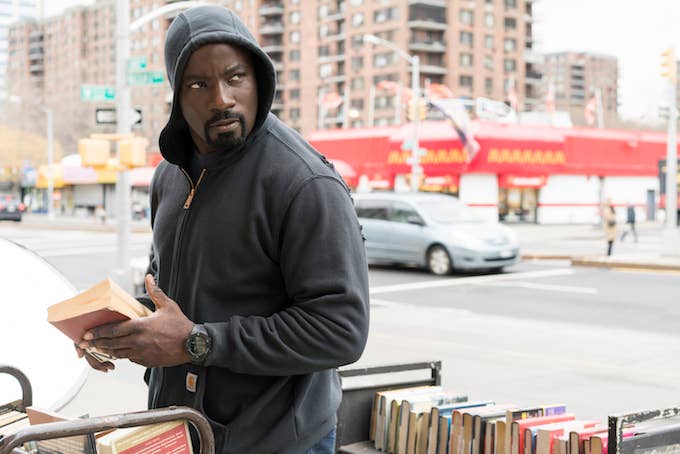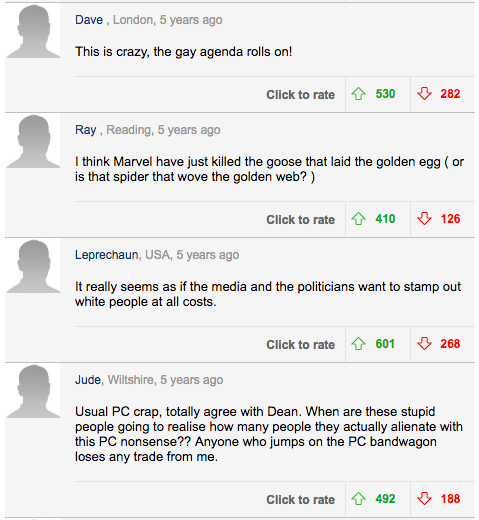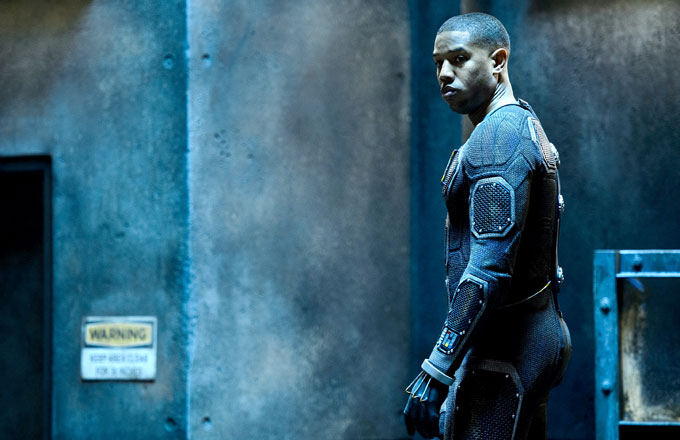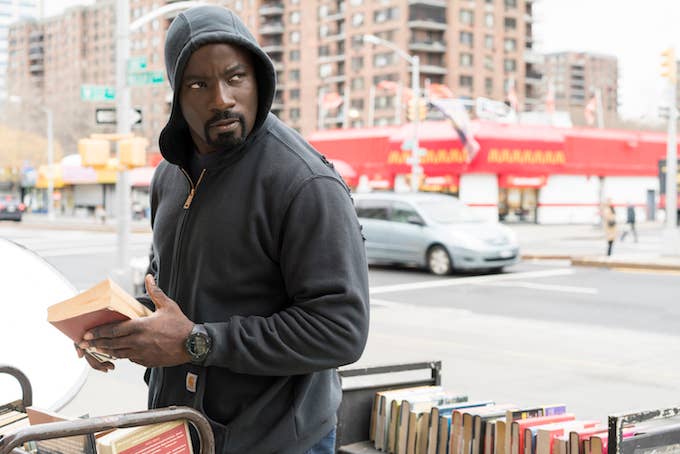
The internet is nothing if not consistent and predictable in its outrage. Last week, amidst a server-breakingly successfulLuke Cage premiere, some viewers took to Twitter to complain that Netflix’s new Marvel series, which focuses on an African American superhero living in Harlem, was racist for its lack of white characters. Setting aside the fact that, no, reverse racism is not actually a thing, this particular outpouring of white tears is just the latest in a series of vitriolic internet uproars orbiting around the skin tone of comic book characters. It all begs the question: are fanboys just inherently a bit racist?
Comic book nerds—and “nerd” is not a pejorative here—have long been known for their borderline obsessive consumption of the medium. In happier times, this stereotype gave us one of the best pop culture characters of a generation: The Simpsons’ pedantic Comic Book Guy. Today, however, with nerd culture out of the closet, comic fan money being the lifeblood of Hollywood, and the anonymity of the internet, discussions about the minutiae of lore has since morphed into a sense of entitlement to said minutiae. The digital age gave this once passive fan base an unprecedented direct line to the producers and authors of the books.
But while things may have occasionally heated up in a debate over who would win in a Batman and Superman brawl, nothing seemed to rile up the base more than casting or reboot decisions about race-bended beloved (or merely sorta liked) characters.
Hints of this sort of outrage first peeked out of the obscure message boards and into the public space in 2008 when Samuel L. Jackson was revealed as Nick Fury in the post-credits stinger of Iron Man. While Jackson is almost universally beloved elsewhere, this role was unacceptable to some because the character of Fury had previously been Caucasian in ink (and played by David Hasselhoff in a campy 90’s movie). These waves of salt about Fury carried over all the way to Jackson’s 2012 reprisal of the role in The Avengers, despite a black-skinned Fury now having been in the Marvel Cinematic Universe and the Marvel Ultimate (comic) Universe for years.
If changing Nick Fury poked the hornets’ nest, darkening The Human Torch whacked it with a bat. Twitter had a minor meltdown when Michael B. Jordan was cast to play Johnny Storm in 2014 for the Fantastic Four reboot. These complaints weren’t racist, of course, as many of those complaining took the time to declare that they were not, in fact, racist.
It’s not just the page-to-screen transitions that have raised fanboy ire, either. In 2011, Marvel had the gall to announce Miles Morales, the half-black, half-Latino teen, would be taking on the mantle of Spider-Man. Though most might see this new Spider-Man as someone for all the non-white downtrodden kids of the world to identify with and draw inspiration from, comic fans made sure to voice their displeasure in any and all article comment sections. Glenn Beck even went so far as to insinuate that this reboot was an example of the fundamental dismantling of core American traditions.

The most common arguments against this sort of reimagining are easily squashable. Cries for authenticity don’t hold much water in a universe where the superheroes are, y’know, fictional. Claims that these changes are craven PC Hollywood outreach tactics ring false when those making them tell the “SJWs” to chill out with the complaining when that same Hollywood machine casting Scarlett Johansson as an Asian anime character. Even trying to skirt the race issue entirely and saying, “Hey, I just don’t like change” seems disingenuous when you stop to consider the constant stream of deaths, births, and other change-based plot devices these serialized soap operas have been trading in for decades.
Marissa Lee, co-founder of Racebending.com, a website that advocates for underrepresented groups in fandom and media, tells Complex that she believes many of these complaints hinge on sociologist Hubert M. Blalock, Jr.’s “power threat theory.” “When you've always had more than enough food to eat, being asked to share your food with someone who is starving may feel like an imposition,” she explains. “To some people, it may even feel like an offensive violation of your right to have whatever you want to eat any time you want to eat it.”
The enormous irony at the center of all this is that the comic book industry as we know it was established by an at-the-time oppressed minority group: Jews. Founding fathers like Jack Kirby (Jacob Kurtzberg) and Stan Lee (Stanley Martin Lieber) borrowed the idea of the golem from Jewish lore and repackaged it into the more secular form of do-gooders like Superman. Forced to use alter-egos similar to those of their characters to avoid anti-Semitic discrimination in the publishing world, these comic pioneers gave the underdogs around the world omnipotent outsider heroes to idolize in an era where the Nazis were still rising to power. Having felt prejudice (and worse) firsthand, the creators filled early comics full of ahead-of-their-time inclusive sentiments. This progressive origin story of the medium only serves to underscore the modern fanboy’s issues with bigotry.

Stan Lee is aware of all the race-centric fan outrage, but gives the benefit of the doubt. Speaking to Entertainment Weekly in 2014 about the Human Torch controversy, he expressed the belief that the complaints were “not because of any personal prejudice,” but because these fans “hate to see any change made.”
While Tom Spurgeon, editor of The Comics Reporter, agrees with both Stan and Marissa Lee (no relation, by the way) that there is strict literalism at play in these controversies, he also thinks there’s bigotry baked into those kinds of reactions. “The rigidity gets extended to racial identity as its own value,” he says. “There is no compelling reason this needs to happen. None. There are almost no originally white superheroes whose race is important to their core narrative.”
This fealty to the source material goes beyond race and beyond comics for some fanboys. This summer’s Ghostbusters reboot faced online sexism from day one and culminated in alt-right wunderkind Milo Yiannopoulos leading a vicious online attack against the film’s black lead, Leslie Jones. While it’s hard to track overlap between the two groups when so much of the harassment was carried out by egg accounts, there’s an undeniably similar tonal streak.
There is, of course, always the possibility that this contingent of angry nerds is just the same vocal minority rearing its ugly head at every opportunity, bolstered by non-fans glomming on to any opportunity to rail against diversity and progressivism (e.g. Glenn Beck). Even if so, it seems comic creators have taken note of the state of race-relations within their base (and the country) and responded with a metaphorical middle finger by essentially revealing Captain America as a sleeper-agent Nazi.
So how can the presumable majority of non-prejudiced fans distance themselves from or grow past this protective plastic sleeve of deplorables? Spurgeon says stay the course and drag the problem children into the righteous path, kicking and screaming. “Comics will be better served in the next few decades if their fans and creators continue to pay attention to these issues, continue to press, and continue to evolve. The best outcome is more diversity, not less.”

